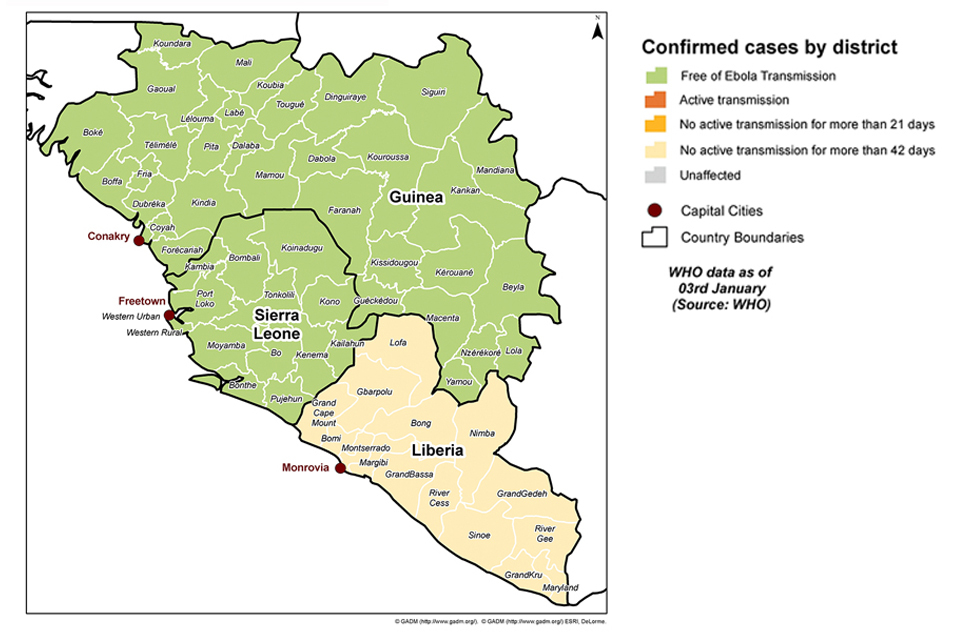HPR volume 10 issue 1: news (8 January)
Updated 16 December 2016
1. Seasonal flu increasing in the UK
Public Health England surveillance systems in England have indicated recent increases in influenza activity, which suggest that influenza is now circulating in the population. Influenza A(H1N1)pdm09 is currently the dominant circulating strain, with increases in positivity in sentinel swabbing in primary care and in influenza-related hospitalisations and admissions to intensive care.
More details on these findings are provided in the latest weekly national influenza report published by PHE on 7 January 2016 [1].
Following these findings, the Chief Medical Officer has written to health professionals in England to advise that neuraminidase inhibitors may be prescribed in primary care according to NICE guidance [2].
1.1 References
-
The PHE Weekly National Influenza Report, 7 January 2016. See Weekly national flu reports.
-
Department of Health, 7 January, 2016. “Influenza season 2015/16 - use of antiviral medicines”, letter from the Chief Medical Officer stating that the use of antiviral drugs for the prevention or treatment of influenza was recommended.
2. Ebola virus disease: international epidemiological summary (at 6 January 2016)
Since the last HPR report on 4 December 2015 [1], there have been no confirmed cases of Ebola virus disease (EVD) reported in West Africa.
Liberia has reported no confirmed cases for six consecutive weeks. The most recent cluster of cases in Liberia was determined to be the result of the re-emergence of Ebola virus that had persisted in a previously infected individual. The last two reported cases in the country were discharged from hospital on 3 December 2015, following two consecutive negative EVD tests. If no further cases are reported, the country will be declared free of human-to-human transmission on 14 January 2016, and the country will then enter a 90-day period of enhanced surveillance.
Guinea was declared free of human-to-human transmission on 29 December 2015 after the completion of 42 days without cases since the last person confirmed to have EVD tested negative for Ebola virus RNA for the second time. Guinea has now entered a 90-day period of enhanced surveillance.
Sierra Leone was declared free of human-to-human transmission on 7 November 2015. The country remains within a 90-day period of enhanced surveillance which is scheduled to conclude on 5 February 2016.
As of 3 January 2016, a total of 28,637 clinically compatible cases of EVD (15,249 confirmed) have been reported associated with the West African outbreak, 11,315 of which have died.
Situation reports on the epidemiological situation in West Africa continue to be published on the WHO’s Ebola Virus Disease Outbreak webpages [2].

Ebola virus disease distribution map (WHO data as at 3 January 2016)
2.1 References
-
WHO Ebola Virus Disease Outbreak webpages
3. Royal Society of Medicine conference on vaccine preventable diseases
The paediatrics and child health section of the Royal Society of Medicine, in collaboration with PHE’s Immunisation Department and St George’s University of London (SGUL), is hosting a one-day conference, on 15 March 2016, on vaccine-preventable diseases in children.
The programme provides a forum for leading scientists in the field to update paediatricians, microbiologists, immunologists, epidemiologists and other public health specialists (and trainees across these specialties) on the national childhood immunisation programme and the current epidemiology of the infectious diseases it aims to prevent.
Other topics to be covered include:
- the role of PHE’s National Infection Service, and its Health Protection Teams, in supporting clinicians who manage children with suspected vaccine-preventable infections
- the clinical management of confirmed vaccine failures
- new childhood vaccines on the horizon
The programme includes a Q&A session during which questions related to vaccine-preventable childhood diseases will be answered by an expert panel.
Contact for further information: Dr Shamez Ladhani shamez.ladhani@phe.gov.uk.
3.1 Further information
Hot topics in vaccine preventable diseases: the A-Z guide to epidemiology, surveillance and management of vaccine-preventable infections, London, 15 March, 2016.
